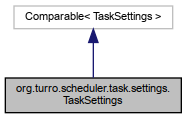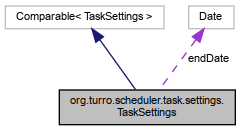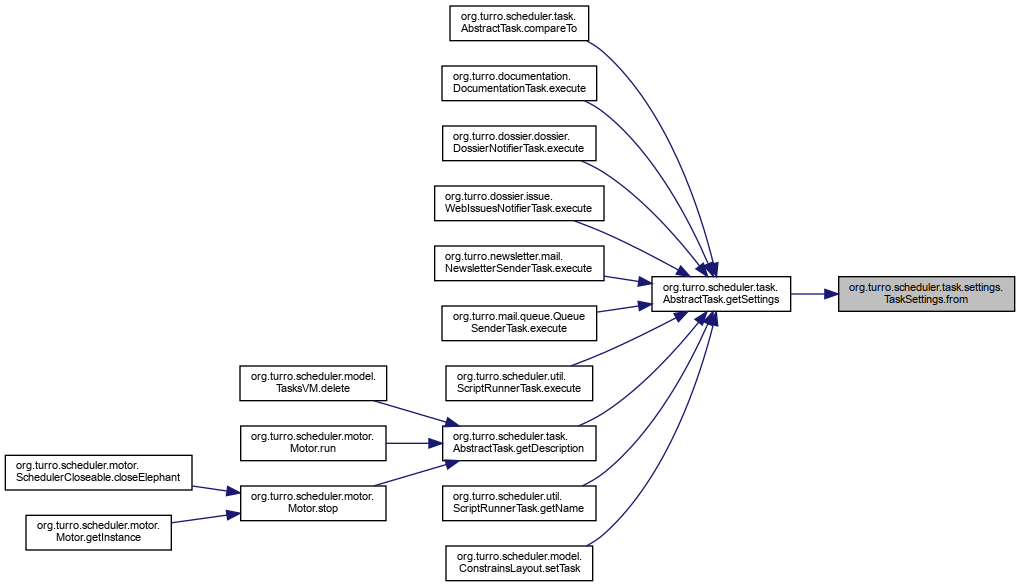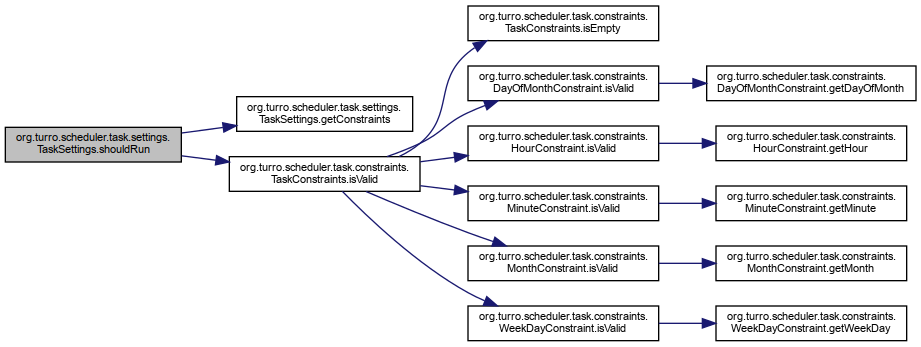◆ build()
Definition at line 110 of file TaskSettings.java.
111 AbstractTask task = (AbstractTask) Reflections.of(
getImplementation()).instance();
112 task.setConstructor(constructor);
113 task.setSettings(
this);
String getImplementation()
◆ compareTo()
| int org.turro.scheduler.task.settings.TaskSettings.compareTo |
( |
TaskSettings |
o | ) |
|
Definition at line 120 of file TaskSettings.java.
121 return Comparison.ascendant()
124 .compare(
getData(), o.getData())
TaskConstraints getConstraints()
◆ equals()
| boolean org.turro.scheduler.task.settings.TaskSettings.equals |
( |
Object |
obj | ) |
|
Definition at line 145 of file TaskSettings.java.
152 if (getClass() != obj.getClass()) {
155 final TaskSettings other = (TaskSettings) obj;
156 if (this.active != other.active) {
159 if (!Objects.equals(
this.implementation, other.implementation)) {
162 if (!Objects.equals(
this.description, other.description)) {
165 if (!Objects.equals(
this.data, other.data)) {
168 if (!Objects.equals(
this.startDate, other.startDate)) {
171 if (!Objects.equals(
this.endDate, other.endDate)) {
174 return Objects.equals(this.constraints, other.constraints);
◆ from()
Definition at line 104 of file TaskSettings.java.
105 TaskSettings settings =
new TaskSettings();
106 settings.setImplementation(task.getClass().getName());
◆ getConstraints()
| TaskConstraints org.turro.scheduler.task.settings.TaskSettings.getConstraints |
( |
| ) |
|
◆ getData()
| String org.turro.scheduler.task.settings.TaskSettings.getData |
( |
| ) |
|
◆ getDescription()
| String org.turro.scheduler.task.settings.TaskSettings.getDescription |
( |
| ) |
|
◆ getEndDate()
| Date org.turro.scheduler.task.settings.TaskSettings.getEndDate |
( |
| ) |
|
◆ getImplementation()
| String org.turro.scheduler.task.settings.TaskSettings.getImplementation |
( |
| ) |
|
◆ getStartDate()
| Date org.turro.scheduler.task.settings.TaskSettings.getStartDate |
( |
| ) |
|
◆ hashCode()
| int org.turro.scheduler.task.settings.TaskSettings.hashCode |
( |
| ) |
|
Definition at line 132 of file TaskSettings.java.
134 hash = 23 * hash + (this.active ? 1 : 0);
135 hash = 23 * hash + Objects.hashCode(this.implementation);
136 hash = 23 * hash + Objects.hashCode(this.description);
137 hash = 23 * hash + Objects.hashCode(this.data);
138 hash = 23 * hash + Objects.hashCode(this.startDate);
139 hash = 23 * hash + Objects.hashCode(this.endDate);
140 hash = 23 * hash + Objects.hashCode(this.constraints);
◆ isActive()
| boolean org.turro.scheduler.task.settings.TaskSettings.isActive |
( |
| ) |
|
◆ setActive()
| void org.turro.scheduler.task.settings.TaskSettings.setActive |
( |
boolean |
active | ) |
|
◆ setConstraints()
| void org.turro.scheduler.task.settings.TaskSettings.setConstraints |
( |
TaskConstraints |
constraints | ) |
|
◆ setData()
| void org.turro.scheduler.task.settings.TaskSettings.setData |
( |
String |
data | ) |
|
◆ setDescription()
| void org.turro.scheduler.task.settings.TaskSettings.setDescription |
( |
String |
description | ) |
|
◆ setEndDate()
| void org.turro.scheduler.task.settings.TaskSettings.setEndDate |
( |
Date |
endDate | ) |
|
◆ setImplementation()
| void org.turro.scheduler.task.settings.TaskSettings.setImplementation |
( |
String |
implementation | ) |
|
◆ setStartDate()
| void org.turro.scheduler.task.settings.TaskSettings.setStartDate |
( |
Date |
startDate | ) |
|
◆ shouldRun()
| boolean org.turro.scheduler.task.settings.TaskSettings.shouldRun |
( |
Date |
now | ) |
|
Definition at line 96 of file TaskSettings.java.
97 return (startDate ==
null || now.after(startDate)) &&
98 (endDate ==
null || now.before(endDate)) &&
boolean isValid(Date date)
The documentation for this class was generated from the following file:










